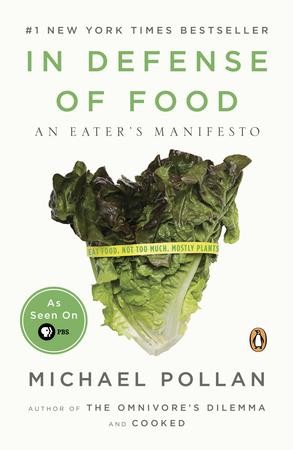

Pollan’s new book, In Defense of Food: An Eater’s Manifesto, picks up the conversation begun two years ago in his acclaimed The Omnivore’s Dilemma. Up with interconnected communities-as long as they don’t grow too institutional in feeling or cynically sucked into “the system.” At the same time, though he is too pragmatic and ironically up-to-date to embrace it fully, he is sympathetic to some of the early-’70s counterculture worldview.

Pollan can sound like someone out of the nineteenth century, preaching the merits of hard work, moderation, and self-reliant optimism, with lingering traces of old Puritan angst. Second, simply from the point of view of writing, it’s interesting to watch how, in nimble twenty-first-century-magazine style, he can remind us of two familiar American personae that in theory should not blend well or feel as current as they do in combination. Through his books and his pieces in the New York Times Magazine, he reaches a wide audience with his enlightening arguments about the ignored costs of our sped-up food chain. First, Pollan has become a rare persuader of integrity and visible public influence. The result is an impressive feat in this age of too much information. And every so often, he steps back, sums up, and notes his own blind spots, as well as the mixed feelings he still can’t sort out. He tells us when he’s describing ideas that have been put forward by others. He’s not embarrassed to ask those who know more for guidance. Roving and idiosyncratic, he moves from first-person scenes (in a grocery store, a meadow, a coop with thousands of chickens and their poop) to background sketches of the science that’s in play, with maybe a quick stride through history. Trusting in his curiosity, Pollan makes it his mission to see and judge things for himself and then offer as a possibly useful gift to us what he has begun to find out. This is happily offset by a sly modesty (“By now,” he self-accuses in 1997’s A Place of My Own: The Education of an Amateur Builder, “you have probably noticed a tendency of mine to lean rather heavily on words and theories in my dealings with the world”), a deftness at animating philosophical problems, and a knack-unusual in books that seek to change minds and habits-for sustaining an atmosphere of suspense. That would be an aesthetic approach, and though Pollan often worries that we’ve lost the sense of pleasure, he is very much the ethicist-and, if we’re honest, he is once in a while even a scold. But this does not lead him to a showily fine prose style. Like all good writers, Pollan aims to describe what he sees as precisely as he can.

This has been a recurring theme in Michael Pollan’s books of late. We prepare our meals from plants and animals-a fact we can choose either to note with some humility or to hide from our awareness by forgetting.


 0 kommentar(er)
0 kommentar(er)
